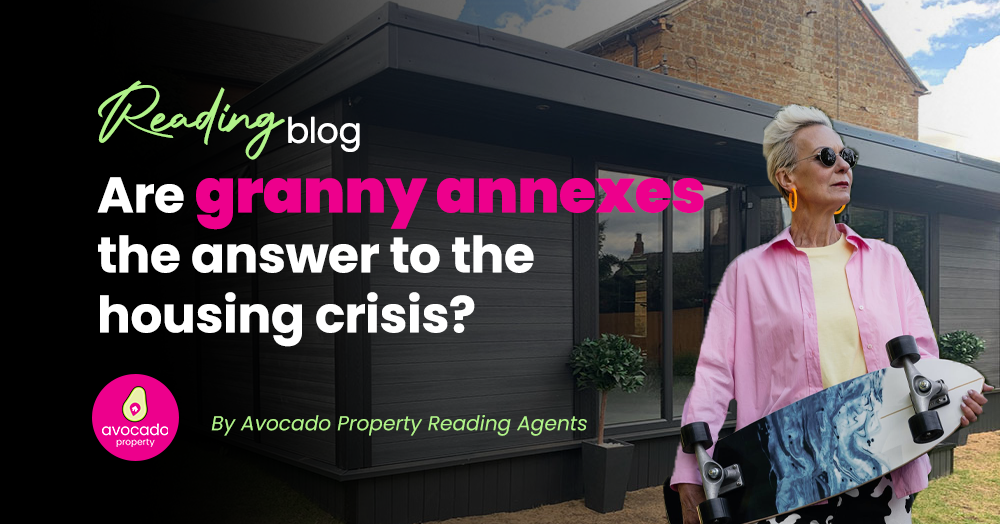
Could granny annexes be the answer to the housing crisis?
Reading Property Market: Could the humble ‘granny annexe’ help solve the Reading housing crisis for mature homeowners?
Most Reading homeowners born before 1960 have been in their homes for more than 25 years.
Yet of all the properties sold in the UK since the first lockdown in the summer of 2020, 50% of those property owners had only been in their homes for six years and four months or less. That means we almost have a two speed housing market.
One market of homeowners in their 20s and 30s who move every four to five years and another property market of homeowners who, when they hit their late 40s, tend to stay put for decades. Yet now those mature homeowners, many of whom are retired and on fixed incomes with pensions, are finding it a lot more challenging to make ends meet with the cost-of-living crisis.
Evidence suggests nationally and locally, a lot of larger houses (property which tends to be owned by mature homeowners) have come onto the market in the last 12 months compared to the previous few years.
There has been a drop of 22.9% of properties priced up to £200,000 on the market in the UK in the last 12 months, yet an increase of 13.3% of properties priced between £500k and £1m.
Focusing on the lower price range nationally, there are 39.4% fewer properties for sale in the price range up to £100k, 27% fewer in the £100k to £150k range and 14.9% fewer in the £150k to £200k range. The range that has seen the highest growth is the £600k to £750k, which has grown by 14.2%
Looking closer to home in Reading …
there are 24% more properties for sale in the Reading area today, compared to six months ago. (1,153 properties for sale now compared to 930 six months ago).
But it gets much more interesting when you split the increases by bedrooms and property type.
Properties with more bedrooms tend to be more expensive than those with fewer. Also, detached and semi-detached properties are more expensive than terraced/townhouses and apartments.
- 5-bed Reading properties – an increase of 54%
- 4-bed Reading properties – an increase of 52%
- 3-bed Reading properties – an increase of 35%
- 2-bed Reading properties – an increase of 17%
- 1-bed Reading properties – an increase of 1%
And now, by type …
- Reading detached properties – an increase of 68%
- Reading semi-detached properties – an increase of 44%
- Reading terraced/town house properties – an increase of 30%
- Reading apartments – an increase of 5%
The increase in these larger Reading homes is great news for second or third-time movers, as it releases larger homes for them to bring up their young families.
Yet, the other side is the lack of properties for these mature Reading homeowners to buy.
There are 12.7 million people aged 65 and over in the UK (19% of the total population), yet there are only 2 million bungalows (which represent 7.2% of all UK property).
When it comes to new properties, the figures are even worse.
Of the 173,660 properties built in 2019, only 2,384 were bungalows.
And this is where the annexe could be one part of the solution.
Annexes are buildings often erected in gardens or extended onto an existing property to be used as separate and independent living accommodation.
Generally, the ‘granny annexe’ has been used to keep one’s parents and grandparents nearby whilst retaining their independence. Roll the clock back to the Millennium; annexes were seen as excess accommodation that added little to the saleability or value of property.
Interestingly though, in the last few years, the annexe has had a renaissance and has become a practical, economical and emotional answer for a more flexible group of homeowners.
Lockdown brought working from home to the fore, and the annexe is undoubtedly an excellent solution for many homeowners.
Lockdown saw many people recognise the importance of having their family close by. I have seen several mature Reading homeowners build an annexe extension in the garden, then move into the annexe themselves and give their original property to their children to live in. Thus helping two families with their accommodation needs and the advantage of shared fuel costs (plus other benefits such as childcare).
Also, as mortgage rates are rising, the annexe could be the salvation for either your first-time buyer child/grandchild who cannot afford to buy their first home because of mortgage affordability rules or who is finding it tough to save a deposit for a mortgage.
The demand is there for annexes. In December 2020, Rightmove reported a year-on-year 89% increase in the number of home buyers and tenants searching for the term ‘annexe’. Demand is high and supply, as seen by these statistics, is low.
Of the 1,153 properties for sale in the Reading area, only 18 have an annexe.
I believe the lockdown made many of us look at how we live in the UK. Many people are adopting, adapting and changing how they look at housing. With recent planning regulation changes, the rules were relaxed a few years ago, which allowed homeowners to extend their homes without planning permission in an arrangement called 'Permitted Development’.
If you are a mature/older Reading homeowner or have mature/older parents and want to look at all your options regarding upsizing, downsizing and annexes then, without any obligation, drop me a message and let's chat through your options.
For everyone else in Reading, what do you think about annexes? And what other solutions could help solve the housing issue in Reading and the UK as a whole?
If you'd like to have an informal chat, get in contact here.
Or if you'd like to find out how much your property is currently worth, click here to use our trusty house price calculator.